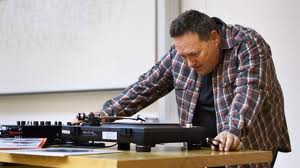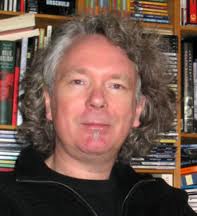The Enjoy Jazz Festival in south-western Germany two weeks ago culminated in an unexpected celebration of jazz’s deep traditions, led by formidable saxophonist Archie Shepp and serene reeds explorer Yusef Lateef. It was a fitting end, also, for an international symposium titled “Lost in Diversity: A Transatlantic Dialogue on the Social Relevance of Jazz,” held at the Heidelberg Center for American Studies at Ruprecht Karls Universität Heidelberg (est. 1386), which
convened musicians, scholars, journalists and presenters to forge new links in a network that’s developing to defy many boundaries, not least of which is the ocean between the U.S. and Europe.
During a week in which headlines of German newspapers and tv news broadcasts continued to hail the re-election of Barack Obama, the value and significance of improvised music born of America’s minority and marginalized populations but now embraced world-wide became increasingly clear. Information on ambitious plans for the second International Jazz Day (April 30, 2013). produced by UNESCO with assistance from the Thelonious Monk Institute of Jazz, further emphasized that jazz (if you dislike that term, supply the synonym of your preference) is being adopted globally for the promotion of peace, education and productivity.
If that seems like a far cry from the intentions of the jazz art form’s founding musicians, you must not have heard Shepp-Lateef (with the remarkable support of bassist Reggie Workman, pianist Mulgrew Miller and drummer Hamid Drake), or attended Enjoy Jazz’s productions of lightning-and-thunder drummer Billy Hart’s quartet, or keyboards master Herbie Hancock, who played grand piano and up-to-the minute electronics, solo. And you certainly missed the modest but penetrating “piano lectures” by Vijay Iyer and Alexander von Schlippenbach, delivered at the Lost in Diversity conference for an inquisitive audience gathered in the University’s hallowed Ault Aula, a fantastically ornamented representation of 19th century German “historicist” interior design.
That space, which all but imposed an aura of hushed awe for tradition and authority via its elaborate woodwork and mural of pageantry, was the site of tensions expressed by Shepp and Lateef, who decry the term “jazz” for 20th century-emergent African-American improvised music, and jazz globalists as represented by Iyer (born and raised in upstate New York by parents who had immigrated from India) and von Schlippenbach, a founding member of the post-WWII German musical avant garde. Lateef, who calls what he plays “autophysiopsychic music” began his lecture by reciting the many negative associations listed by Webster’s dictionary for the word “jazz.” Shepp, perhaps the most explicitly political musician to emerge in the 1960s from the direct  influence  of John Coltrane, is also firm in his position that what’s called “jazz” should be referred to as something greater and specific about its basis in African and African-American music practice. He spoke after von Schlippenbach had concisely related his story of involvement in jazz in 1960s Germany, and when asked about European jazz Shepp (currently based in Europe) responded dryly, “What is that?”
Iyer’s talk, complemented by his brief, introspective recital, concerned liminal issues of personal identity, stylistic choice and creative purpose. His entire presentation was in stark contrast to Herbie Hancock’s unexpectedly plugged-in display. After opening his concert in the splendid Feierabendhaus (Ludwigshafen) venue operated by Enjoy Jazz’s sponsor BASF with an abstracted rendition on a concert grand of Wayne Shorter’s “Footprints,” Hancock turned to electric gear including his keytar, Korg equipment and a bank of connected laptops which provided loops and backdrops for his performance of “Cantaloup Island” (adopting the arrangement by UK dj/acid jazz group Us3), “Future Shock” and “Chameleon.” The crowd, predominantly middle-aged, had anticipated more acoustic music. Which is what they got, in full force, from drummer Hart’s group with pianist Ethan Iverson, tenor saxophonist Mark Turner and bassist Ben Street.
These concerts were the nightly attractions for participants in the academic symposium. Over the course of two days, we presented and listened to papers reflecting some current thinking about jazz (or synonym). Among those: Daniel Fischlin of University of Guelph “Improvisation, Community and Social Practice project gave a paper “The Fierce Urgency of Now: Improvisation, Rights and the Ethics of Co-Creation,” concerning perspectives of diverse communities partaking of improvisational (not only “jazz”) values and strategies, and improvisation as an engine of agency, resulting in the imagination (if not construction) of new social relations. Eric Porter, professor of American Studies, History and History of Consciousness at the University of California, Santa Cruz described the tenacity despite complexities and ambiguities of New Orleans’ second line tradition. Wolfram Knauer, director of the Jazzinstitute Darmstadt, examined the relevance of the German academical concept of “social relevance” in relation to jazz as it occurs, is understood or applied functionally in general society.
Ted Panken, Brooklyn-based jazz journalist, compared the organizational similarities and aesthetic directions of Jazz at Lincoln Center and the Association for the Advancement of Creative Musicians (he quoted AACM eminence Muhal Richard Abrams as saying the comparison was “a stretch”). Christian Dalgas, project manager of the Copenhagen Jazz Festival, outlined that major fest’s activities. Rainer Kern, director of the Enjoy Jazz festival, talked on “Jazz and the City.”
Novelist/musician/dj Thomas Meinecke did a turntable lecture, playing snippets of lps that demonstrated the piquancy and breadth of the jazz impulse. My remarks were on the topic of “Motivations in U.S. Jazz” — and I shall post the essay w/slide show I put together elsewhere on this blog.
Most heartening was the information by Tom Carter, president of the Thelonious Monk Institute of Jazz, about the continuation of International Jazz Day, which in 2013 will launch with an ambitious event in Istanbul, intended to acknowledge societal developments in the Middle East, to reinforce jazz’s accessibility to that region, and further globalize jazz via simultaneous concerts, workshops, educational initiatives and celebrations to be planned and promoted everywhere possible.
During his remarks opening the “Lost in Diversity” symposium, its organizer Christian Broecking explained that
“lost” was meant to be understood as the way Kurt Weill applied it in his musical “Lost in the Stars” — rapt, engrossed. entranced, ecstatic. Upon attending the participants’ presentations, we were certainly aswim with ideas. But the week’s ultimate impression came from the music, of course, especially the two-tenor finale, which Enjoy Jazz’s Kern had been angling for over the course of three years, in hopes of repeating the 2005 success of Ornette Coleman in Ludwigshafen, which resulted in the Pulitzer Prize-winning, live-in-concert album Sound Grammar. Shepp and Lateef are, after all, among the most highly regarded exemplars of the purist approach to “jazz,” complementary yet contrasting in their personal demeanors and sound. Reggie Workman (who must be considered, on the basis of his lifelong career and accomplishments, a Jazz Master) with Mulgrew Miller and Hamid Drake comprised a surpassingly capable support system — a necessity if the strengths of the horns were to be highlighted, and their differences bridged.
Indeed, that’s what the rhythm section did, while Shepp, wearing suit and fedora, served as MC, blew tenor and soprano saxes and called the set tunes, Lateef perched on a stool, his passel of instruments — tenor, wood and tine whistles, flute, oboe — at hand.  The five started with a freely unfolding improvisation, moved on to a bright Shepp composition for one of his daughters, then “Steam,” on which he sang as well as played about his young cousin, shot dead in Philadelphia’s streets. They took up Ellington’s “In A Sentimental Mood,” returned to fulfill a “prepared,” improv built upon a pre-recorded backdrop, then took on another Shepp song, “Ujamma” — at the end of which the pa system suddenly blew out. A 15 minute intermission was called for, while the Feierabendhaus staff scrambled to diagnose and repair the problem.
When electricity, quintet and audience returned, it was everyone had tuned up their intensities a notch. Shepp, who after surgery in the 1980s which affected his embouchure has had a woolier sound, wailed with urgent, creative intensity, and sang a lusty straightforward blues. Lateef performed an exquisite oboe version of “C.C. Rider” and sang a keening spiritual. Mulgrew Miller sparkled and Hamid Drake swung, while Workman was the hub of connection,
lending nuanced pulse and tone precisely where most needed. He and Miller kept in notable eye-contact during the encore demanded by an audience ovation — Ellington’s “Don’t Get Around Much Anymore.” Again, Shepp gave all his lusty if untrained voice to the lyric, plus rapt attention to the collective improv meant to bring the song to its close — though Lateef seemed more interested in lingering over the phrases.
Somehow magically, miraculously, the five musicians ended together as one. Much more, the audience roared. We were all lost — caught up, breathless, in awe — of the spontaneous group doings, which gave a lift to all involved. Growls, flares, flashes, smears, flubs, bombs, boasts, sighs, understatements, grooves, bust outs, blendings: players and listeners alike, enlivened by the sounds. And so many sounds, emitted by such a breadth of individuals. Brilliant diversity being its own reward, relevance was readily recognize to have been fully attained.



